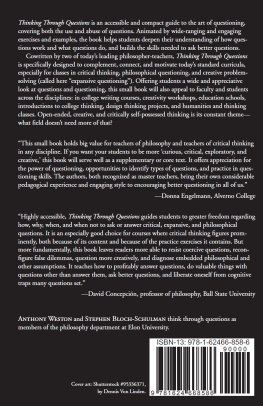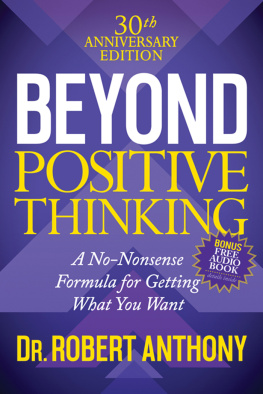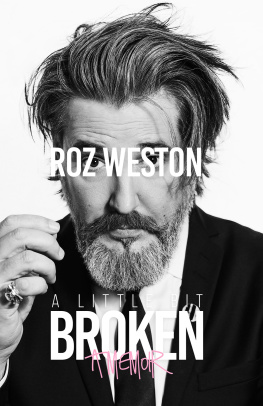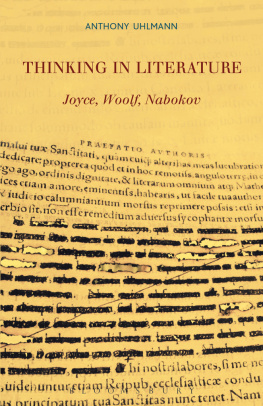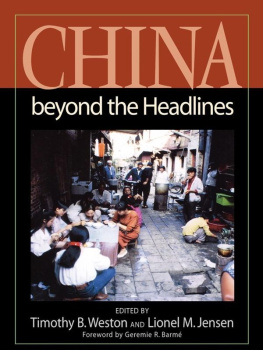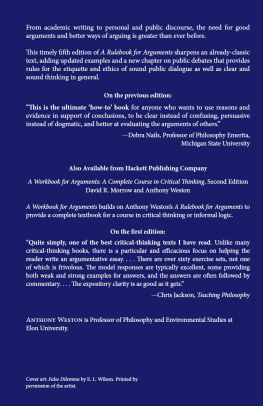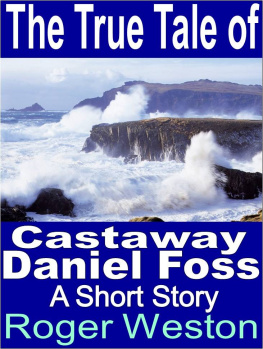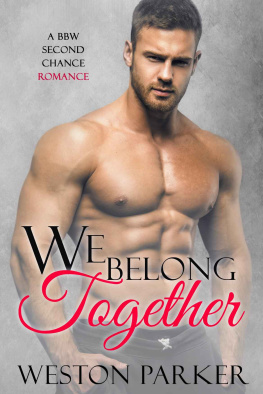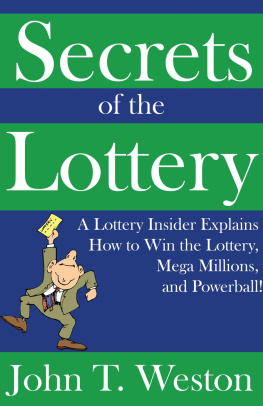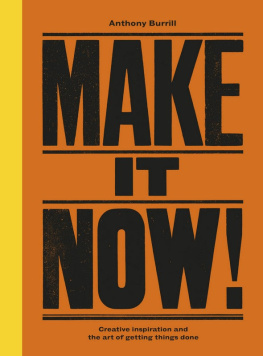Weston Anthony - Thinking Through Questions
Here you can read online Weston Anthony - Thinking Through Questions full text of the book (entire story) in english for free. Download pdf and epub, get meaning, cover and reviews about this ebook. year: 2020, publisher: Hackett Publishing Company, Incorporated, genre: Children. Description of the work, (preface) as well as reviews are available. Best literature library LitArk.com created for fans of good reading and offers a wide selection of genres:
Romance novel
Science fiction
Adventure
Detective
Science
History
Home and family
Prose
Art
Politics
Computer
Non-fiction
Religion
Business
Children
Humor
Choose a favorite category and find really read worthwhile books. Enjoy immersion in the world of imagination, feel the emotions of the characters or learn something new for yourself, make an fascinating discovery.
- Book:Thinking Through Questions
- Author:
- Publisher:Hackett Publishing Company, Incorporated
- Genre:
- Year:2020
- Rating:4 / 5
- Favourites:Add to favourites
- Your mark:
- 80
- 1
- 2
- 3
- 4
- 5
Thinking Through Questions: summary, description and annotation
We offer to read an annotation, description, summary or preface (depends on what the author of the book "Thinking Through Questions" wrote himself). If you haven't found the necessary information about the book — write in the comments, we will try to find it.
Thinking Through Questions — read online for free the complete book (whole text) full work
Below is the text of the book, divided by pages. System saving the place of the last page read, allows you to conveniently read the book "Thinking Through Questions" online for free, without having to search again every time where you left off. Put a bookmark, and you can go to the page where you finished reading at any time.
Font size:
Interval:
Bookmark:
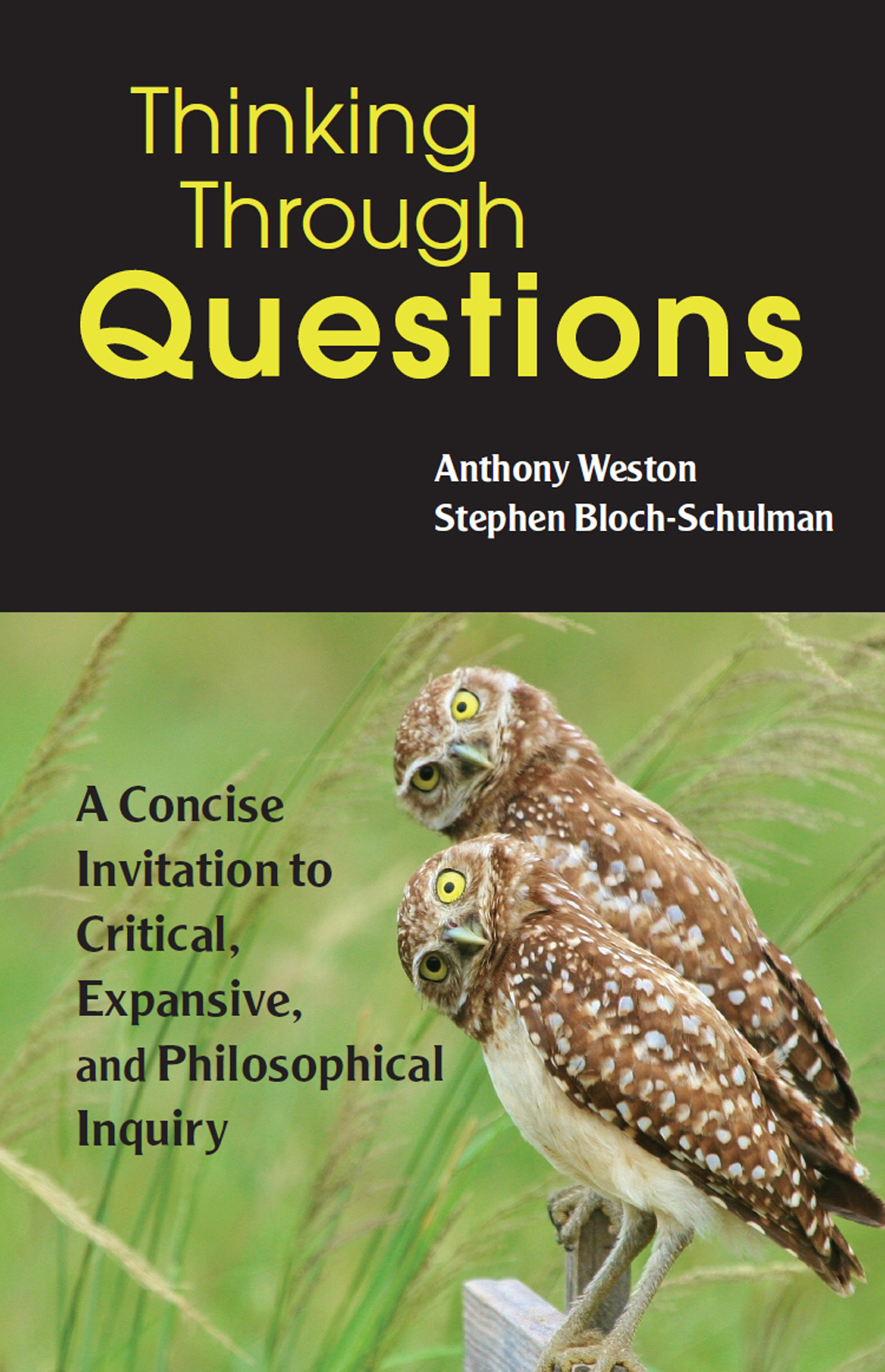
Thinking Through Questions
A Concise Invitation to Critical,
Expansive, and Philosophical Inquiry
Thinking Through Questions
A Concise Invitation to Critical,
Expansive, and Philosophical Inquiry
Anthony Weston
Stephen Bloch-Schulman
Hackett Publishing Company, Inc.
Indianapolis/Cambridge
Copyright 2020 by Hackett Publishing Company, Inc.
All rights reserved
Printed in the United States of America
23 22 21 20 1 2 3 4 5 6 7
For further information, please address
Hackett Publishing Company, Inc.
P.O. Box 44937
Indianapolis, Indiana 46244-0937
www.hackettpublishing.com
Cover design by Deborah Wilkes
Interior design by Laura Clark
Composition by Aptara, Inc.
Library of Congress Control Number: 2019952425
ISBN-13: 978-1-62466-866-1 (cloth)
ISBN-13: 978-1-62466-858-6 (pbk.)
ePub3 ISBN: 978-1-62466-901-9
David R. Morrow, Giving Reasons: An Extremely Short Introduction to Critical Thinking .
David R. Morrow and Anthony Weston, A Workbook for Arguments: A Complete Course in Critical Thinking, Third Edition .
Anthony Weston, A Rulebook for Arguments, Fifth Edition .
This book is dedicated to our parents, our partners, and our childrento those who raised us to ask good questions and those who keep us always (!) on our toes with more.
{vii} Contents
The page numbers in curly braces {} correspond to the print edition of this title.
{viii}
{ix}
This book offers an energetic and concise practical guide to the use of questions. Its aim is to help you sharpen your critical questioning, ramp up your creative questioning, and better understand philosophical questioning. It should also leave you more alert to certain common misuses of questioning, so that you are able to turn questionable questions to better effect. In the end, the hope is to help you ask better questions: in school, at work, in public forums... in life!
Today popular bookstores offer whole books full of questions. One even offers a thousand and one questions for any occasion. Thinking Through Questions offers a few hundred interesting and provocative questions too, if you add them all upeach chapter has extensive exercisesand you could read it just for them. Still, youll quickly see that better questioning takes much more than amusing yourself or provoking your friends with long lists of questions, even very good ones.
This book aims to teach questioning as an art . Better questioning calls upon specific skills, built up through practice and grounded in fuller understanding of questions themselves. You need specific and focused skill to be able to critically question some assertion or argument rather than just accept or reject it. You need other kinds of skills to question your way toward a more expansive range of options when some problem, big or small, seems thoroughly stuck. You need different skills yet again to come to grips with real philosophical questions.
Questioning also may sometimes go awry. It pays to know how to respond to hostile questions or limiting questions. Students also need to know how to better use questions in their studies. This book offers you some first steps in all of these directions. This is why its title has a double meaning: this book offers you ways to use questions to think better, more deeply, more perceptively (that is, to think using questions) but also tunes you to some of the ways we ought to question certain questions and be suspicious of them (that is, think critically about the questions themselves).
Chapter 1, Questions about Questions, addresses some essential questions about questions themselves. What is a question, after all? Why are there so many of them? And why study them anyway?
{x} Chapter 2 outlines First Steps with Questions . A first step is to clarify the intention of the questionto consider what kind of response is needed. Next, it is often essential to clarify the questions terms. Then, catch your breathdont necessarily rush to answer. Entertain more than one answer. Persist when needed... which may be often. Also, questioning is not necessarily for the faint of heart: sometimes it takes real courage.
Chapters 3, 4, and 5 consider key questions in each of three areas. Chapter 3 explores Key Critical Questions . Critical questioning seeks out the best sources for beliefs or claims and aims to make the best inferences from well-founded facts or experiences. This chapter can stand alone as a rough outline of critical thinking generally, and it can serve equally well as an introduction to a deeper-diving course in critical thinking that begins by giving critical questioning itself a broad context and an approachable rationale.
Were often urged to think outside of the box, but were seldom taught how to do so. Chapter 4 therefore introduces Key Expansive Questions : specific questions that prompt us to think more creatively, for example about problems that may seem thoroughly stuck, and to find new directions and new ideas across the board, even when we may think the possibilities have been exhausted. Creative questioning is a learnable skilldont ever say, You cant learn creativitybut, like other skills, it takes specific methods, and those methods take practice. Once again, this book will get you started, and it will offer some hows and whys for some surprising, and surprisingly powerful, methods of creative and expansive questioning.
Chapter 5 introduces Key Philosophical Questions , for example about the assumptions behind our usual beliefs and values and about the ways in which they might be ultimately justified (that is, backed up with decent evidence)... or not. Once again our goal is certainly not to cover all of philosophy, or even introduce a few major figures, but to orient readers toward philosophical questioning as a way of thinking.
These are skills that philosophers hone over years of practice. Other bookstextbooks or original sourceswill take you farther in philosophy and in philosophical questioning, just as they can take you farther in critical thinking or creative problem solving. But first you must know what you are getting into, and why. Thats enough for this book.
Chapter 6 surveys Questionable Questions . These are the problematic questions, including loaded questions, power plays, and other {xi} manipulative or fruitless questions and styles of questioning. Chapter 6 offers multiple strategies for reframing and reversing such questionable questions. This too takes skill and practice. You will pick up some methods of fighting back tooconstructively, clearheadedly, and even with good humor.
Finally, Chapter 7 is specifically For Students at the college or advanced high school level. We distinguish two broadly different types of classes: Question-Answering Classes and Questioning-Centered Classes . Thinking through questions is necessary in both kinds of classes, but in quite different ways. You need to know the difference, and how to approach each. Come with uslong-time college teachers ourselvesfor a quick tour.
As this book took shape, we were grateful for the advice and support of many colleagues, especially Nim Batchelor, Ann Cahill, and Ryan Johnson of the Philosophy Department at Elon, as well as co-conspirators farther afield, especially Rebecca Scott, David Concepcin, and Donna Engelmann, who served as a reviewer for Hackett Publishing Company along with a number of other very helpful anonymous readers. Stephen specifically wishes to thank the Critical Whiteness Studies class he and Libby Coyner co-taught (with the help of Nate Jones) in the Spring of 2019. Jonathan Shaw compiled the list of student questions that became part B of the exercise set at the end of the book.
Font size:
Interval:
Bookmark:
Similar books «Thinking Through Questions»
Look at similar books to Thinking Through Questions. We have selected literature similar in name and meaning in the hope of providing readers with more options to find new, interesting, not yet read works.
Discussion, reviews of the book Thinking Through Questions and just readers' own opinions. Leave your comments, write what you think about the work, its meaning or the main characters. Specify what exactly you liked and what you didn't like, and why you think so.

